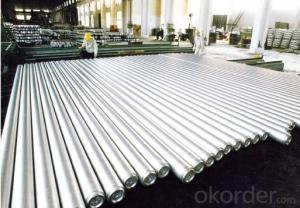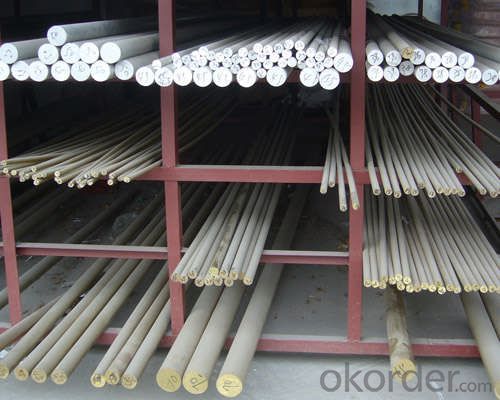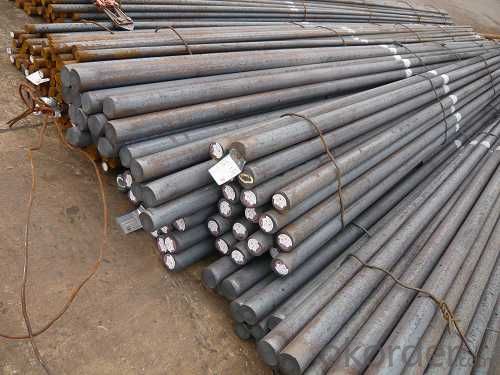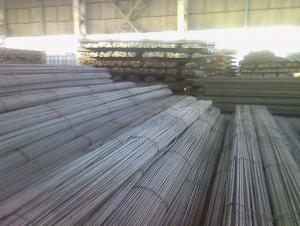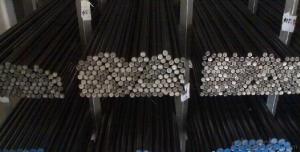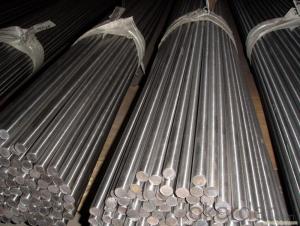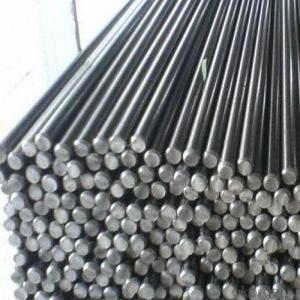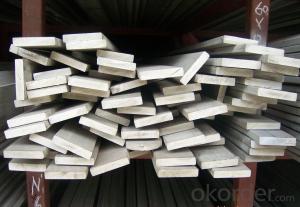Spring Steel 65Si2MnA
- Loading Port:
- China Main Port
- Payment Terms:
- TT OR LC
- Min Order Qty:
- -
- Supply Capability:
- -
OKorder Service Pledge
Quality Product, Order Online Tracking, Timely Delivery
OKorder Financial Service
Credit Rating, Credit Services, Credit Purchasing
You Might Also Like
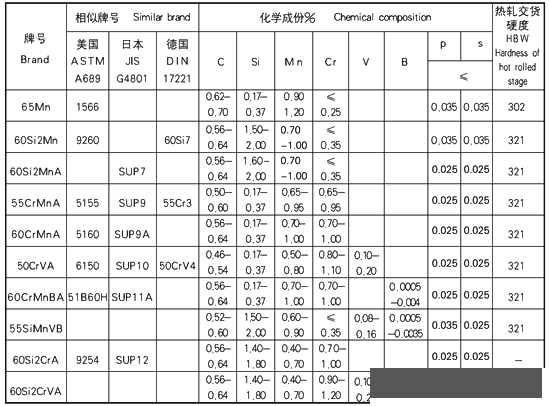
- Q: How do you store and handle steel round bars?
- There are several important considerations when it comes to the storage and handling of steel round bars. Firstly, it is crucial to have a clean and dry storage area that is free from moisture and corrosive materials. This will help prevent damage to the bars, such as rust. To prevent deformation or sagging, the steel round bars should be stored horizontally on racks or a flat surface. It is advisable to stack them in a manner that avoids putting excessive pressure on any individual bar, as this can cause bending or warping. For safe handling, it is recommended to use appropriate lifting equipment like cranes, forklifts, or hoists. Manual handling should be minimized, as steel bars can be heavy and difficult to maneuver. When using lifting equipment, it is important to secure and balance the bars properly to prevent accidents or injuries. Furthermore, it is essential to use protective measures such as gloves and safety shoes when handling steel round bars, as they may have sharp edges or rough surfaces. Wearing proper personal protective equipment (PPE) is necessary to minimize the risk of cuts, abrasions, or other injuries. Regular inspections should be carried out to check for any signs of damage, such as dents, cracks, or corrosion. Damaged bars should be separated and either repaired or discarded, depending on the severity of the damage. By adhering to these storage and handling guidelines, you can ensure the durability and quality of steel round bars, while also creating a safe working environment for yourself and others.
- Q: How are steel round bars used in the manufacturing of valves and fittings?
- Valve and fitting manufacturing commonly utilizes steel round bars for their strength, durability, and versatility. These bars serve as the primary raw material for various valve and fitting components. A significant application of steel round bars in valve manufacturing involves producing valve stems. Valve stems control fluid or gas flow through the valve. The round bars are machined and threaded to create the stem, which connects to the valve disc or plug. Steel round bars are chosen for this purpose due to their high tensile strength, ensuring the stem can withstand the required pressure and torque to operate the valve. In fittings manufacturing, steel round bars are frequently used to produce threaded connectors, nipples, and couplings. These components are integral for joining pipes or tubes, enabling fluid or gas transfer in different systems. Steel round bars are easily machinable, allowing manufacturers to create precise threads and shapes necessary for these fittings. Additionally, steel round bars are also employed in fabricating the body or housing of valves and fittings. The bars can be cut, forged, or machined into the desired shape, providing a robust and dependable structure for the valve or fitting. The use of steel in the body guarantees the component's ability to endure high pressures, temperature fluctuations, and corrosive environments. In conclusion, steel round bars have a crucial role in valve and fitting manufacturing. Their strength, durability, and machinability make them an exceptional choice for creating vital components like valve stems, threaded connectors, and the bodies of valves and fittings.
- Q: Are steel round bars prone to deformation?
- When steel round bars are manufactured and used correctly, they usually do not deform. Steel is recognized for its strong tensile strength and durability, which means it can resist bending or warping in normal situations. However, it is essential to remember that excessive force or mishandling can still lead to deformation in steel round bars. Overloading, improper storage, or using inappropriate machining techniques can all contribute to the bars bending or twisting. Hence, it is vital to adhere to recommended guidelines and industry standards to guarantee the durability and longevity of steel round bars.
- Q: How do you calculate the weight of a steel round bar based on its length and diameter?
- To calculate the weight of a steel round bar based on its length and diameter, you can use the following equation: Weight = (π/4) x (Diameter^2) x Length x Density Here, π represents the mathematical constant pi (approximately 3.14159), Diameter is the measurement of the steel round bar across its widest point, Length is the overall length of the bar, and Density is the density of steel, which is typically around 7850 kilograms per cubic meter. To calculate the weight, first square the diameter, then multiply it by the length and density. Finally, multiply the result by π/4 to obtain the weight of the steel round bar in the desired units (typically kilograms or pounds). It's important to note that this equation assumes the steel round bar is a solid cylinder with a uniform diameter. If the bar has any variations or irregularities, the weight calculated using this equation may not be entirely accurate.
- Q: What are steel round bars?
- Steel round bars are long, cylindrical metal bars that are made from steel. They are commonly used in various industries such as construction, manufacturing, and engineering. These bars are known for their strength, durability, and versatility. Steel round bars are typically produced through a hot rolling process, where a solid steel billet is heated and passed through a series of rollers to achieve the desired shape and size. They come in a range of sizes and grades, with different properties depending on the specific application. These bars are often used as structural components in buildings, as shafts in machinery, as support bars in concrete structures, and as raw material for the production of other steel products. Due to their high tensile strength and resistance to corrosion, steel round bars are widely preferred in the construction and manufacturing sectors.
- Q: Can steel round bars be used in the production of musical instruments?
- Yes, steel round bars can be used in the production of musical instruments. Steel is a versatile material that offers a range of desirable properties such as strength, durability, and resonance. While wood is commonly used in the construction of musical instruments, steel can be employed in certain applications to enhance the instrument's sound and performance. Steel round bars can be utilized in the manufacturing of various components, such as keys or valves for wind instruments like saxophones or trumpets. These bars can also be used to create the internal support structures in instruments like guitars or cellos, providing stability and enhancing tonal qualities. Additionally, steel round bars can be used in the construction of percussion instruments such as steel drums or xylophones, where their strong and resonant properties are highly desirable. Overall, while steel is not as commonly used as wood in musical instrument production, it can certainly be employed in specific cases to achieve desired sound characteristics and structural integrity.
- Q: What are the different types of steel round bar finishes?
- There are several different types of steel round bar finishes available, each with its own unique properties and benefits. Some common types of steel round bar finishes include: 1. Hot Rolled: This finish is achieved by heating the steel to a high temperature and then rolling it while it is still hot. Hot rolled steel round bars have a rough surface and a blue-grey color. This finish is commonly used for structural applications where aesthetics are not a priority. 2. Cold Rolled: In contrast to hot rolled steel, cold rolled steel round bars are processed at room temperature. This results in a smoother surface and tighter dimensional tolerances. Cold rolled steel round bars are often used in applications that require a more polished look or where precise measurements are essential. 3. Turned and Polished: This finish involves removing the outer layer of the steel round bar through a process called turning. After turning, the bar is polished to achieve a smooth and shiny surface. Turned and polished steel round bars are commonly used in decorative applications or where a high-quality appearance is desired. 4. Ground: Ground steel round bars undergo a grinding process to remove imperfections and achieve a smooth, uniform surface. This finish is often used when tight tolerances and precise measurements are required, such as in machine parts or tools. 5. Chrome Plated: Chrome plating involves applying a layer of chromium onto the surface of the steel round bar. This finish provides enhanced corrosion resistance and a lustrous appearance. Chrome plated steel round bars are frequently used in applications where the material will be exposed to moisture or harsh environments. 6. Galvanized: Galvanizing is the process of coating steel with a layer of zinc to protect it from corrosion. Galvanized steel round bars have a characteristic silver appearance and are commonly used in outdoor applications or environments where rust is a concern. These are just a few examples of the different types of steel round bar finishes available. The choice of finish will depend on the specific requirements of the application, such as aesthetics, corrosion resistance, or dimensional tolerances.
- Q: What are the different grades of stainless steel round bars for marine applications?
- The different grades of stainless steel round bars for marine applications include 316, 316L, and 304.
- Q: How do you determine the strength and hardness of a steel round bar?
- To determine the strength and hardness of a steel round bar, several tests and techniques can be employed. One of the most common methods is the tensile strength test. In this test, a sample of the steel round bar is subjected to a gradually increasing load until it reaches its breaking point. The maximum load it can withstand before breaking is recorded, which gives an indication of the bar's strength. Hardness testing is another crucial measure of steel round bar quality. The Rockwell hardness test is frequently used, where a diamond or tungsten carbide ball is pressed into the surface of the bar with a specific load. The depth of the indentation made by the ball is measured, and the hardness value is determined based on a standardized scale. Additionally, the Brinell hardness test can be utilized, where a hardened steel ball is pressed into the surface of the round bar with a specific load. The diameter of the indentation formed is measured, and the hardness is calculated based on the applied load and the size of the indentation. Furthermore, there are non-destructive techniques such as ultrasonic testing and magnetic particle inspection that can provide information about the internal structure, defects, and cracks within the steel round bar, thus indirectly indicating its strength and hardness. It is important to note that various factors, including the composition of the steel, its heat treatment, and the manufacturing process, can influence the strength and hardness of a round bar. Therefore, it is advisable to consult standards and specifications that define the expected properties for the specific type of steel round bar being tested.
- Q: How do you prevent warping during welding of steel round bars?
- To prevent warping when welding steel round bars, there are several precautions that can be taken: 1. Ensure proper fit-up: Before welding, make sure the round bars are correctly aligned and fitted together. Any gaps or misalignments can cause uneven heating and cooling, increasing the likelihood of warping. 2. Divide welding into smaller sections: Instead of continuously welding along the entire length of the round bar, break it down into multiple smaller sections. This will help distribute heat more evenly and decrease the risk of warping. 3. Use low heat input techniques: Employ welding techniques like pulse welding or tack welding that minimize heat input. These methods allow for controlled and intermittent heating, reducing the chances of warping. 4. Consider preheating: Preheating the round bars before welding can also prevent warping, especially with thicker bars or when welding dissimilar metals. Preheating helps minimize the temperature difference between the weld and the surrounding material, reducing the risk of warping. 5. Monitor and control heat input: Keep a close eye on the heat input during welding. Excessive heat can cause rapid expansion and contraction, leading to warping. Use appropriate welding parameters, such as lower amperage and shorter welding times, to control the heat input. 6. Utilize welding fixtures: Use welding fixtures or jigs to securely hold the round bars in place during welding. This helps maintain proper alignment and prevents movement, reducing the chance of warping. 7. Allow for natural cooling: After welding, let the round bars cool down slowly and naturally. Avoid rapid cooling methods like quenching, as they can induce stress and increase the risk of warping. By implementing these measures, the likelihood of warping when welding steel round bars can be significantly reduced, resulting in higher quality and more dependable welded joints.
Send your message to us
Spring Steel 65Si2MnA
- Loading Port:
- China Main Port
- Payment Terms:
- TT OR LC
- Min Order Qty:
- -
- Supply Capability:
- -
OKorder Service Pledge
Quality Product, Order Online Tracking, Timely Delivery
OKorder Financial Service
Credit Rating, Credit Services, Credit Purchasing
Similar products
Hot products
Hot Searches
Related keywords
